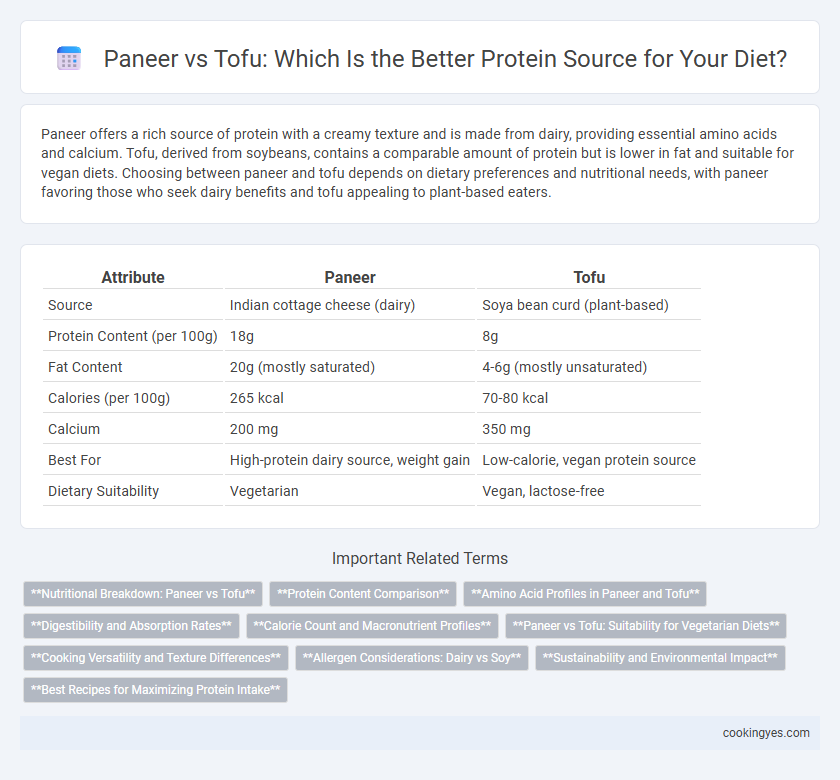Paneer offers a rich source of protein with a creamy texture and is made from dairy, providing essential amino acids and calcium. Tofu, derived from soybeans, contains a comparable amount of protein but is lower in fat and suitable for vegan diets. Choosing between paneer and tofu depends on dietary preferences and nutritional needs, with paneer favoring those who seek dairy benefits and tofu appealing to plant-based eaters.
Table of Comparison
| Attribute | Paneer | Tofu |
|---|---|---|
| Source | Indian cottage cheese (dairy) | Soya bean curd (plant-based) |
| Protein Content (per 100g) | 18g | 8g |
| Fat Content | 20g (mostly saturated) | 4-6g (mostly unsaturated) |
| Calories (per 100g) | 265 kcal | 70-80 kcal |
| Calcium | 200 mg | 350 mg |
| Best For | High-protein dairy source, weight gain | Low-calorie, vegan protein source |
| Dietary Suitability | Vegetarian | Vegan, lactose-free |
Nutritional Breakdown: Paneer vs Tofu
Paneer contains approximately 18 grams of protein per 100 grams, along with high levels of calcium and saturated fats, making it a rich source of dairy-based protein. Tofu offers about 8 grams of protein per 100 grams and is lower in calories, saturated fat, and cholesterol, with beneficial isoflavones and calcium fortification. Both serve as valuable protein sources but differ in fat content and micronutrients, depending on dietary preferences and nutritional goals.
Protein Content Comparison
Paneer contains approximately 18 grams of protein per 100 grams, making it a dense source of high-quality dairy protein rich in essential amino acids. Tofu provides around 8 to 15 grams of protein per 100 grams depending on firmness, with firm tofu generally offering protein levels comparable to paneer but often slightly lower. The higher protein content and complete amino acid profile in paneer make it a preferred protein source in vegetarian diets seeking concentrated dairy-based nutrition.
Amino Acid Profiles in Paneer and Tofu
Paneer provides a complete amino acid profile with high levels of essential amino acids like lysine and leucine, making it a superior protein source for muscle repair and growth. Tofu, derived from soybeans, also contains a balanced amino acid profile but is comparatively lower in methionine, an essential amino acid crucial for metabolism. Both offer quality plant-based proteins; however, paneer's dairy origin ensures a more bioavailable protein source rich in branched-chain amino acids (BCAAs).
Digestibility and Absorption Rates
Paneer offers higher protein digestibility and absorption rates compared to tofu due to its rich casein content, which is easier for the body to break down. The presence of calcium in paneer enhances protein utilization, supporting muscle synthesis and repair more effectively. Tofu contains antinutrients like phytates that can reduce protein absorption, making paneer a more efficient protein source for optimal nutritional benefits.
Calorie Count and Macronutrient Profiles
Paneer contains approximately 265 calories and 18 grams of protein per 100 grams, making it a calorie-dense source rich in fats and proteins, ideal for those seeking muscle growth. Tofu provides around 76 calories and 8 grams of protein per 100 grams, offering a lower-calorie, plant-based alternative with moderate protein and low fat content. The macronutrient profile of paneer includes higher saturated fats and protein, whereas tofu is favored for its balanced macros with less fat, suitable for calorie-conscious diets.
Paneer vs Tofu: Suitability for Vegetarian Diets
Paneer offers a rich source of complete protein, containing all essential amino acids, making it ideal for lacto-vegetarians who include dairy in their diets. Tofu, derived from soybeans, provides a plant-based protein suitable for vegans and those avoiding animal products, with a comparable protein content but lower saturated fat. Both paneer and tofu contribute valuable proteins to vegetarian diets, but paneer is preferred for its higher calcium and vitamin B12 content, while tofu suits stricter vegetarian or vegan lifestyles.
Cooking Versatility and Texture Differences
Paneer offers a firm, crumbly texture that holds shape well in grilling, frying, and baking, making it ideal for rich curries and tandoori dishes, while tofu varies from silken to extra-firm, with silken tofu blending smoothly into sauces and desserts and firmer varieties suitable for stir-fries and grilling. Paneer's milky, slightly tangy taste provides a distinctive flavor contrast to tofu's mild, neutral profile, allowing it to absorb spices and marinades differently. Texture and cooking versatility differences make paneer preferred in Indian cuisine for its ability to remain intact in high-heat cooking, whereas tofu's adaptability suits diverse Asian and vegan preparations requiring both creamy and firm consistencies.
Allergen Considerations: Dairy vs Soy
Paneer is a dairy-based protein source containing casein and lactose, which may trigger allergic reactions in individuals with milk allergies or lactose intolerance. Tofu, derived from soybeans, poses allergen risks for those with soy allergies, a common concern in sensitive populations. Choosing between paneer and tofu requires careful evaluation of individual allergen sensitivities related to dairy and soy proteins.
Sustainability and Environmental Impact
Paneer, derived from dairy, has a higher environmental impact due to methane emissions and water usage associated with livestock farming, while tofu, made from soybeans, generally requires less water and produces fewer greenhouse gases. Tofu's plant-based origin makes it a more sustainable protein source, supporting reduced carbon footprints and promoting soil health through crop rotation. Consumers seeking eco-friendly options often prefer tofu over paneer for minimizing environmental degradation.
Best Recipes for Maximizing Protein Intake
Paneer, a high-protein dairy product containing about 18 grams of protein per 100 grams, offers rich amino acids ideal for muscle growth, while tofu provides approximately 8 grams of plant-based protein per 100 grams. Best recipes to maximize paneer's protein intake include grilled paneer tikka, paneer bhurji, and palak paneer, which retain protein content while combining it with nutrient-dense ingredients like spinach and spices. For tofu, stir-fried tofu with vegetables, tofu scramble, and baked tofu marinated in soy sauce and garlic enhance protein absorption and flavor.
Paneer vs Tofu for protein source Infographic

 cookingyes.com
cookingyes.com